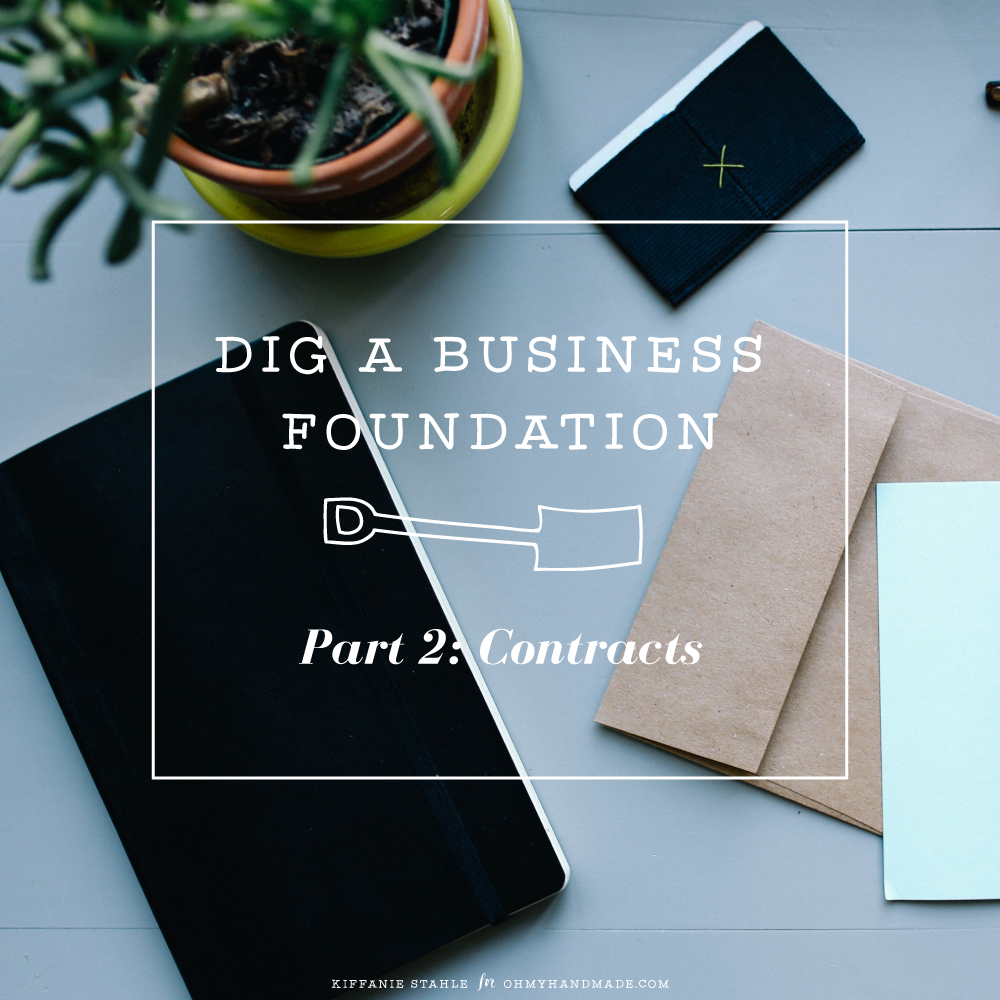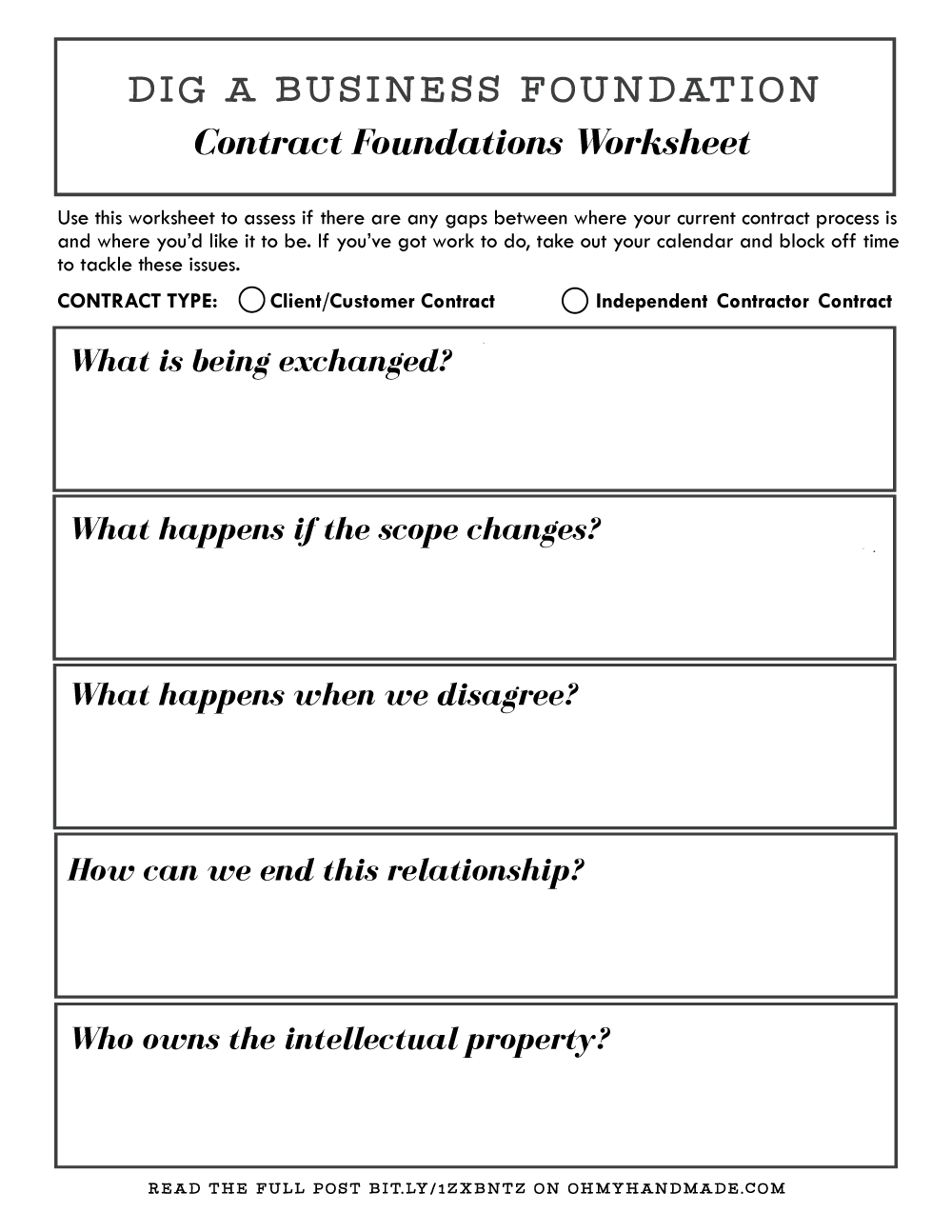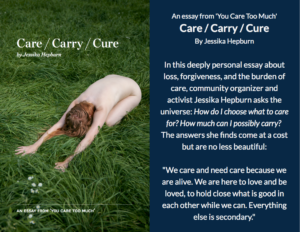

Also in this series: {Part 1}
I’ll admit it; I’m a total contract nerd. I’m the one that goes off in the corner and reads through every last word when I’m buying a new phone and they hand me a contract to sign.
So, I’m sad that contracts often get a bad rap. Since contracts really just define the boundaries of your relationship with the other party. They are there to say what you expect from each other, what the ideal outcome will be, and what happens if something gets off-track.
Having contracts that make sure you get paid, aren’t taken advantage of, and protect your creations are essential to the foundation of every creative business.
At minimum you should have two kinds of contracts in place for your business: client/customer contract and independent contractor agreement.
Client/Customer Contract
Getting paid by your clients and customers is how you keep the lights running, so it’s a no-brainer to have a solid contract with these people.
While I could give you a whole list of items that you could include in your contract, I think the following are the most critical.
What is being exchanged?
There’s a contract term called “mutual consideration”. This is a fancy way of saying that to have a valid contract both of you need to give something to the other party. This can take on many forms; it might be that one of you is providing services and the other giving cold hard cash. Or it could be that you allow someone to use your illustrations on their blog in exchange for publicity. The bottom line is we need to define what this exchange will be and clearly outline not only what’s included, but anything not included (in other words you should clearly outline the scope of the project).
What happens if the scope changes?
At some point the other party might ask you for a task outside the original scope. Because of this, it’s important to outline how this agreement can be changed. For example, if you sold 50 pieces of jewelry to a wholesale account and they’d like more do they have to order a minimum number of pieces? Can they do this via e-mail? If you provide graphic design and web design services and I hire you to create a graphic, but during the process we decide I need work done to my site, do we need a new contract? Or can we add an addendum to our current one?
What happens when we disagree?
If for some reason the two of you can’t agree on what the contract says, or if one of you is failing to live up to the promises you made in the contract, how will disputes be resolved? Do you have a mutual friend that you want to listen to your cases and then make a decision? Do you want an outside third-party, like a mediator, to be the one to make the decision?
How can we end this relationship?
While we hope that the contract will be a success, sometimes it’s just not a good fit and you need to get out. So you should outline how the contract can end. It might be that either of you can end the contract for any or no reason with 30-days notice. Or you could end it with 10-days notice if one of you fails to live up to your end the exchange.
Who owns the intellectual property?
If you are creating or exchanging something of a creative nature, you need to define who owns the intellectual property that will be created as a result of the contract. If you are collaborating, you might be co-owners. If you are the artist and they are giving you cash, you might retain the copyrights and only grant them a license to use your work.
Independent Contractor Agreement
At times, your business will be hiring independent contractors to help you. This might be a virtual assistant, a web designer, or a social media consultant. Some of these professionals will have their own contracts for you to sign, but many times you’ll be asked to provide a contract.
All of the items that we discussed for your client contract should be outlined here as well. In addition to these things you also should make sure that you are hiring them as an independent contractor and not as an employee. This assures that you are not responsible to pay their taxes or give them benefits.
When you are given a contract
Even though you have these contracts in your arsenal, it doesn’t mean that you’ll always get to use them. Sometimes the other side will want you to sign their contract.
This is where my biggest contract rule comes into play:
Never sign a contract you don’t understand
This is where most creative businesses get in trouble. They are given a contract, understand 90% of it, and sign it. Sometimes it works out, but occasionally, something goes wrong and they get upset about what the other side is doing. When I’m wearing my lawyer hat, my least favorite conversation to have with a creative is to tell them that I understand why they are mad, but there is really nothing we can do about it because the other side is a-ok according to the contract.
Having a process in place to evaluate and assess the contracts given to you is critical for securing your business foundation. Your process might involve Internet research to translate the legalese into English or you might have an expert on your team that you pass this task off to.
Click here or the image above to print out this worksheet and pull out your contracts. As you work through the worksheet assess if there are any gaps between where your current contract process is and where you’d like it to be. If you’ve got work to do, take out your calendar and block off time to tackle these issues.
Congrats! You’ve now reinforced the foundation of your business by getting your contracts squared away.
I’d love to know in the comments below which contracts you are going to tackle next. Or if you are all squared away, let us know so we can give you a high five.
Kiffanie Stahle | The artist’s JD
 Kiffanie Stahle is a lawyer, photographer, and small business owner. In April 2014, she created the artist’s JD, a place where creative business owners can get the tools and resources they need to tackle the legal aspects of their businesses. Kiffanie believes that the law doesn’t have to be scary or hard to understand. And she knows this to be true because she’s been practicing law since 2011. When Kiffanie is not creating art or running her business, you might find her concocting something in the kitchen, soaking up the sun, or plotting her next adventure.
Kiffanie Stahle is a lawyer, photographer, and small business owner. In April 2014, she created the artist’s JD, a place where creative business owners can get the tools and resources they need to tackle the legal aspects of their businesses. Kiffanie believes that the law doesn’t have to be scary or hard to understand. And she knows this to be true because she’s been practicing law since 2011. When Kiffanie is not creating art or running her business, you might find her concocting something in the kitchen, soaking up the sun, or plotting her next adventure.
WEBSITE | FACEBOOK | TWITTER | INSTAGRAM
This is part 2 of a 4 part series publishing every Thursday in January to help you dig a solid foundation for your business in 2015! Mark your calendars for a special Q & A #OMHG chat with Kiffanie on Twitter, January 29th from 1-2pm EST.
Also in this series: {Part 1}



[…] Goodness on shoring up your business foundations. We talked about getting your website, contracts, structure, and intellectual property shored […]